#rasul gamzatov
Explore tagged Tumblr posts
Quote
The path to inner peace begins when you refuse to be defined by the opinions of others.
Rasul Gamzatov
#Rasul Gamzatov#babylove#mundogoodvibes#cachostumblr#tumblrtee#tumblrpicture#tumblrboy#smileyface#goodsmilecompany#selflove#quotes#beautifulsmile#tumblrquote#loveofmylife#loveyourself#smilemakeover
1 note
·
View note
Text

8 сентября - 100 лет со дня рождения Расула Гамзатовича Гамзатова (1923-2003), советского и российского поэта, прозаика, переводчика, участника Великой Отечественной войны, публициста и политического деятеля. Героя Социалистического Труда. Народного поэта Дагестанской АССР.
Родился в ауле Цада Х��нзахского района Дагестана в семье Гамзата Цадасы (1877—1951) — народного поэта Дагестана. Учился в Аранинской средней школе. Окончил Аварское педучилище в 1939 году. До 1941 года работал школьным учителем, затем — помощником режиссёра в театре, журналистом в газетах и на радио. С 1945 по 1950 годы учился в Литературном институте им. А. М. Горького в Москве. Избирался депутатом ВС Дагестанской АССР, заместителем Председателя ВС ДАССР, депутатом и членом президиума ВС СССР. Несколько десятилетий был делегатом писательских съездов Дагестана, РСФСР и СССР, членом бюро солидарности писателей стран Азии и Африки, членом Комитета по Ленинской и Государственной премиям СССР, членом правления Советского комитета защиты мира, заместителем Председателя Советского комитета солидарности народов Азии и Африки. Депутат ВС СССР 6-8-го созывов с 1962 года. В 1962—1966 годах и с 1971 года был членом Президиума Верховного Совета СССР. Действительный член Петровской академии наук и искусств.
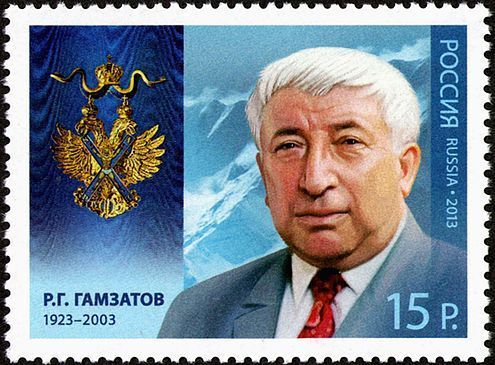
Скончался 3 ноября 2003 года в ЦКБ в Москве. Похоронен на старом мусульманском кладбище в Тарки у подножья горы Тарки-Тау, рядом с могилой жены. Расул начал писать стихи в 1932 году, печататься — в 1937 году, в республиканской аварской газете «Большевик гор». Первая книга на аварском языке вышла в 1943 году. Он переводил на аварский язык классическую и современную русскую литературу, в том числе А. С. Пушкина и М. Ю. Лермонтова, В. В. Маяковского и С. А. Есенина. В Литературном институте им. А. М. Горького Гамзатов познакомился и подружился с молодыми поэтами, в том числе с Н. Гребневым, которые начали переводить стихи Расула Гамзатова на русский язык. Поэту-переводчику Н. Гребневу принадлежит перевод особенно широко известных «Журавлей», которые стали песней по инициативе и в исполнении М. Н. Бернеса в 1969 году. Ряд других стихов Расула Гамзатова тоже стали песнями, например, «Исчезли солнечные дни». С Гамзатовым тесно работали многие композиторы, в том числе Дмитрий Кабалевский, Ян Френкель, Раймонд Паулс, Юрий Антонов, Александра Пахмутова; среди исполнителей песен на его стихи — Анна Герман, Галина Вишневская, Муслим Магомаев, Иосиф Кобзон, Валерий Леонтьев, София Ротару, Вахтанг Кикабидзе, Марк Бернес. Р. Гамзатов был членом редколлегии журналов «Новый Мир», «Дружба народов», газет «Литературная газета», «Литературная Россия», других газет и журналов. С 1951 года и до конца жизни возглавлял писательскую организацию Дагестана. Изданы десятки его поэтических, прозаических и публицистических книг на аварском и русском языках, на многих языках Дагестана, Кавказа и всего мира.
2 notes
·
View notes
Text

Исчезли солнечные дни, И птицы улетели. И вот проводим мы одни Неделю за неделей. Вдвоём с тобой, вдвоём с тобой Остались ты да я, Любимая, любимая, Бесценная моя…. /Расул Гамзатов


Sunny days have disappeared, And the birds flew away. And so we are alone Week after week.
Just you and me, just you and me My darling, my darling, My priceless…. /Rasul Gamzatov

100 notes
·
View notes
Text



Cranes - vintage postcard set (1990)
Full set of 15 postcards comemorating 45 years from the end of the Great Patriotic War in 1945. The fronts of the cards show beautiful pictures of nature. On the backs are sepia war-time photos. These cards are not actually suitable for mailing because the photos take up most of the space.
Inside the set folder are lyrics and sheet music to a famous song that celebrates the end of the war - "Cranes" written by Yan Frenkel and Rasul Gamzatov.
Available in my shop for $13 + $9 shipping (registered, by Russian Mail).
Currently shipping from St Petersburg.
Message me if you want to buy this. Currently available items. I combine shipping. How to buy
48 notes
·
View notes
Text
Pov: You can't stop thinking about that one person but make it urdu poetry
Me tere sapne dekhu by Rasul Gamzatov
Barkhaa barse chhat par main tere sapne dekhu
Barf gire parbat par main tere sapne dekhu
Subh ki neel-pari main tere sapne dekhu
Koyal dhum machaye main tere sapne dekhu
Aaye aur ud jaaye main tere sapne dekhu

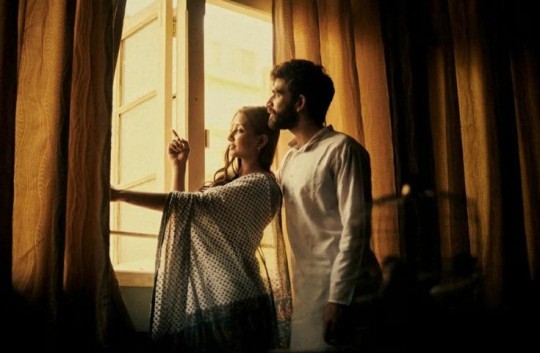
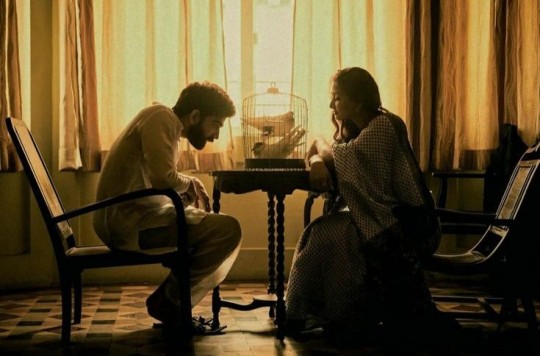
Baagon mein patte mahke main tere sapne dekhu
Shabnam ke moti dahken main tere sapne dekhu
Is pyaar mein koi dhokaa hai,
Tu naar nahi kuchh aur hai shai
Varna kyu har ek samay main tere sapne dekhu


#urdu#urdu love#urdu sher#urdu poetry#urdu lines#urdu literature#urdu stuff#urdu quote#urdu shayari#urdu poems#urdu posts#hindi words#desi aesthetic#om is ok ig#hindi poetry
45 notes
·
View notes
Text
Whoever wants to......
"Whoever wants to go mad, read Kafka.
Whoever wants to understand suicide, read Hemingway's hints aren't there but lets assume "A Farewell to Arms or Ernest Hemingway in general or lets say Camus or lets keep it broad "Rambo" can be replaced with Albert Camus "The Myth of Sisyphus".
Whoever wants to love, read Neruda.
Whoever wants to sing, read Mahmoud Darwish.
Whoever wants to be happy, read Aziz Nesin.
Whoever wants to dream, read Isabel Allende.
Whoever wants to play with existence, read Marquez.
Whoever wants to be truly happy, read Kazantzakis.
Whoever wants revenge on the world, read Al-Maghout.
Whoever wants to understand the cunning of writing, read Muhammad Al-Muneef.
Whoever wants to learn to love the earth, read Hamzatov (Rasul Gamzatov).
Whoever wants to deny, read Friedrich Nietzsche.
Whoever wants to turn back time, read One Thousand and One Nights.
Whoever wants wildness, read Henry Miller.
Whoever wants to dive into the vastness of the sea, read Conrad.
Whoever wants to understand life deeply, read Jean Genet.
And whoever wants to discover humanity, read Fyodor Dostoevsky."
Painting by our community member (with thanks )
Mr. Naveen Gr
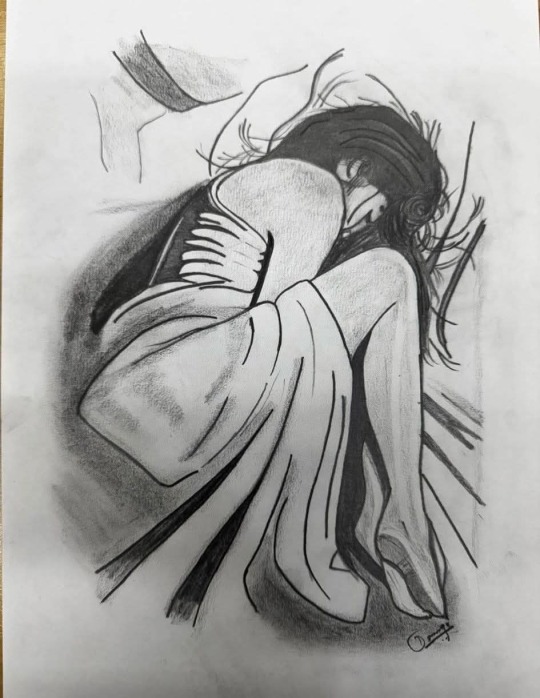
5 notes
·
View notes
Text

I learned to walk to come to you.
I learned to speak in order to speak to you.
I fell in love with flowers to give you.
I fell in love with you to love life.
Rasul Gamzatov.
54 notes
·
View notes
Photo
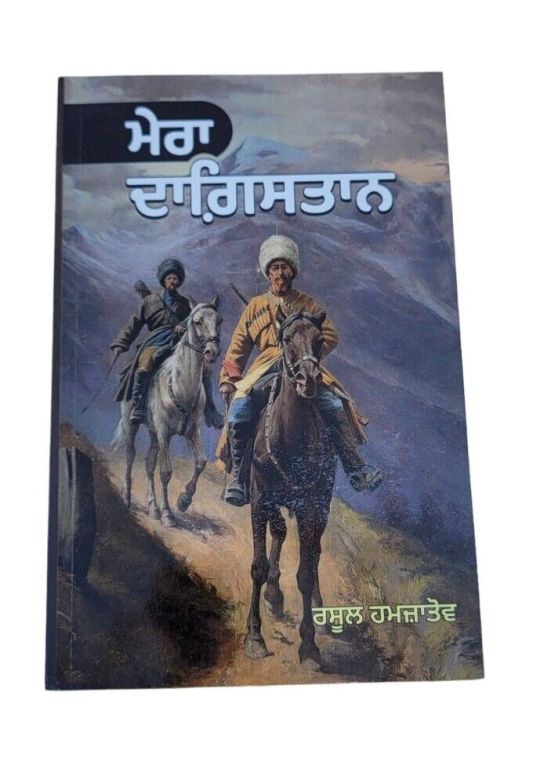
My Dagestan Mera Daghestan Rasul Gamzatov Punjabi Reading Literature Book MD NBC
ਮੇਰਾ ਦਾਗਿਸਤਾਨ Mera Dagestan My Dagestan Book by Rasool Gamzatov - Best Punjabi Gurmukhi Reading Literature Book
Book Ref: MD
World Famous Book - First Time Full Edition translated into Punjabi
Punjabi Literature Book
Pages 495; Paperback
Author: Rasul Gamzatov
Translated by Harjinder, Neha Nayab
Language: Indian Punjabi - Gurmukhi
We have Punjabi Literature books of several Popular writes in stock, please message more information.
We have many other Punjabi books (Punjabi Alphabets, Punjabi Mini Stories, Punjabi word Sounds, Punjabi Pronunciation, Grand mother's Punjabi Stories with Morals etc.) listed in our eBay shop to learn Punjabi and will personally recommend you all.
Should you have any queries please do not hesitate to contact us.
Postage discounts for multi-buys.
P.S. Colour of item may slightly vary due to camera flash and light conditions. Please note cover of paper may vary as publishers keep on changing front of books each time they publish new edition.
Please buy with confidence.
https://www.ebay.co.uk/itm/My-Dagestan-Mera-Daghestan-Rasul-Gamzatov-Punjabi-Reading-Literature-Book-MD-NBC-/256233261294
0 notes
Text
Cranes by Rasul Gamzatov
Sometimes I think that soldiers, who have never come back to us from the blood-covered plains, escaped the ground and didn't cross the River, but turned instead into white screeching cranes. And since that time the flock is flying, narrow or wide, or long — and maybe that is why so often and with such a sudden sorrow we stop abruptly, staring at the sky. On flies the wedge trespassing every border — a sad formation, ranks of do-re-mi, and there's a gap in their open order: it is the space they have reserved for me. The day will come: beneath an evening cloud I'll fly, crane on my right, crane on my left, and in a voice like theirs, shrill and loud, call out, call out to those on earth I've left.
2 notes
·
View notes
Photo

Rasul Gamzatov, People’s Poet of Daghestan – A Life By: Shailendra Chauhan Gamzatov, Rasul Gamzatovich, was born on 8 September 1923 in the Avar village of Tsada, Daghestan in the north-east Caucasus.
3 notes
·
View notes
Text

sorry but this has been popping into my head with every notification i get for this post.
“fucking chad ivan 360 no-scopeing your ass with a tomahawk while doing a backflip with enough vodka in his system to kill a bear” should have been the motto of the soviet armed forces
also please listen to “журавли” (zhuravli/cranes) performed by mark bernes (марк бернес). originally by an avar-dagestani poet named rasul gamzatov, it was translated to russian and sung as a ballad. it’s about fallen soldiers of the second world war and it is one of the best and most devastating songs ever sung.
in honour of the 80th anniversary of victory against the nazis,
weakest soviets in ww2 (aka actual superhumans):

^ alexey maresyev, 1916-2001. between august 1941 and march 1942, he shot down four german planes. on 5 april, 1942, his plane was shot down near staraya russa, where he was nearly captured. the crash resulted in extensive injuries, completely shattering both of his lower legs and causing extreme lacerations. he crawled for 18 days through a blizzard on his shattered legs and with gangrene and sepsis, sneaking past several german patrol units on the way. when he reached soviet troops, he was put on a stretcher and covered with a sheet, as it seemed certain that he would die. but a doctor operated on him and amputated both of his legs above the knee without permission. he worked furiously on rehabilitation and learned to control his prosthetics, and he returned to combat as a pilot in june of 1943. after returning, he shot down 3 german planes in a single battle. he later earned a phd in history and became a member of the supreme soviet.

^ mariya shcherbachenko, 1922-2016. she hid during the german occupation of her village, and then constructed defensive structures on the donets river. she was trained as a medic and was sent to combat in ukraine. she was one of the first 13 soviet soldiers to reach the dnieper river in september of 1943, and beginning on on 4 october, she personally carried 112 wounded soldiers from the battlefield and back across the river, providing first aid until they reached a medical station. she continued to serve on the frontlines until 1944, when she began attending medical school. however, she dropped out and completed a law degree instead, later working as a lawyer in kyiv.

^ lyudmila pavlichenko, 1916-1974. she was engaged to a fellow sniper who was fatally wounded; she had to carry his body off the battlefield. her longest sniper battle lasted over 24 hours, against a german sniper who had already killed several of her comrades. they spent an entire day silently hunting each other, until she finally shot him. by the time she was wounded and taken out of active duty in 1942, she had killed 309 nazis. on a visit to the united states to meet president roosevelt, she said “i’m only 25, gentlemen, and i’ve already killed 309 fascist oppressors. don’t you think, gentlemen, that you’ve been hiding behind my back for too long?” after the war, she completed her education in history, which had been put on hold by the war, and she worked as a historian and research assistant at soviet navy headquarters.

^ valentina grizodubova, 1909-1993. she commanded an aviation unit that carried out thousands of sorties to provide essential supplies to partisans and to evacuate the injured. her unit delivered thousands of tonnes of ammunition to resistance fighters. under her orders, a new airstrip was built near the dnieper river to facilitate safer conditions for officers along the ukrainian front. she was the only woman out of 10 members to serve on the “extraordinary state commission for ascertaining and investigating crimes perpetrated by the german-fascist invaders and their accomplices” (ChGK), which testified at nuremberg. later, she trained test pilot svetlana savitskaya (1948-), who became a cosmonaut and the first woman to complete a spacewalk.

^ semyon nomokonov, 1900-1973. he was evenk, and nicknamed the “taiga shaman” by the nazis. he was a lifelong hunter who began his military service as a medic. while carrying a wounded soldier from the field, he shot a distant german sniper dead without aiming, after which he officially became a sniper himself. he was known for his incredible eyesight and innovative tactics, using mirrors and sticks to distract the enemy soldiers. he killed 368 nazis, including a major general, and was wounded 8 times. he mostly used a simple rifle without a telescopic sight, and yet he had remarkable accuracy even at long distances and with very little time to aim. after the war, he returned to his village on a horse and became a carpenter.

^ yevdokiya bershanskaya, 1913-1982. she commanded the all-female 588th night bomber regiment, later the 46th guards night bomber aviation regiment. her pilots were extremely fierce and accurate. they had a habit of idling their engines and dropping to glide directly above their targets before releasing their bombs and turning their engines back to full power. this technique inspired their nazi-given nickname of “night witches”. they flew over 23,000 sorties and dropped over 3,000 tonnes of bombs. under bershanskaya’s command, 23 members of the regiment were awarded hero of the soviet union, with bershanskaya being awarded order of the red banner twice and becoming the only woman to ever receive the order of suvorov. after the war, she married a fellow bomber and had three daughters.

^ ivan sereda, 1919-1950. he graduated from culinary school shortly before the war began and he soon became a cook for troops on the latvian front. when german tanks appeared behind their lines while he was alone, he hid in the forest. when the nazis stopped to raid his field kitchen for supplies, he attacked them with the only weapon he had, an axe. the tanks began to fire at him with machine guns, but he jumped on top of them and bent the barrels with his axe. he then began to yell commands to his fellow soldiers, who weren’t there at the time (although the germans didn’t know that). he ordered the imaginary soldiers to fire at the tanks and he used his axe to simulate gunfire. when the germans tried to escape their tanks, he held them at gunpoint with an old and dysfunctional rifle until his comrades actually arrived and subdued them. after a serious injury, he was demobilised and served as the head of a village council.

^ zoya kosmodemyanskaya, 1923-1941. although still a high school student living in moscow, she volunteered as a partisan in 1941. on 27 november, she received an assignment with two other partisans to burn a village occupied by a german cavalry regiment. one of the partisans did not wait for the others and left their designated meeting spot early. the second was captured. when kosmodemyanskaya found herself alone, she returned to the village to continue the arson campaign. she was captured, stripped, lashed over 200 times, burned repeatedly, and tortured and interrogated in several other ways, but she refused to give the germans any information about partisan activities. the next morning she was marched to the centre of the village with a sign around her neck reading “houseburner”. she was hanged, and her body was left hanging for several weeks. her breasts were cut off by germans and her body was desecrated by collaborators. she became famous after an elderly peasant who witnessed her execution told the story to a reporter visiting the village once the nazis had left. the witness said “they were hanging her and she was giving a speech. they were hanging her and she was threatening them.” when stalin heard about her, he said “here is the people’s heroine” and he ordered soviets not to take germans from the regiment that executed her as prisoners, but to kill them. soviet sources say that her last words were “hey, comrades! why are you looking so sad? be brave, fight, beat the nazis, burn, wipe them out! i'm not afraid to die, comrades. it is happiness to die for one's people!” or “farewell, comrades! fight, do not be afraid! stalin is with us! stalin will come!” she told the germans “you hang me now, but i'm not alone. there are 200,000,000 of us. you can't hang us all. they will avenge me.”

^ yekaterina budanova, 1916-1943. she was one of only two female flying aces in the world, along with fellow soviet lydia litvyak (1921-1943). with litvyak and other famous fighter pilots like maria kuznetsova (1919-1990) and raisa belyaeva (1912-1943), she flew in a regiment founded by marina raskova (1912-1943), who gained stalin’s personal approval to form 3 all-female aviation regiments. budanova is credited with 5+ aerial victories, and was known for her agile and aggressive piloting. although initially skeptical of her skill, her male comrades quickly came to respect her as a formidable fighter, and they trusted her enough to grant her special combat privileges. during her last flight, she engaged in combat with a german fighter plane. her plane caught on fire, forcing her to crash in no-man’s land. farmers pulled her from the aircraft, but she was already dead.

^ roza shanina, 1924-1945. after her brother was killed, she asked to serve but was denied. even when women between 16 and 45 became eligible for the draft, she was not initially called, because the local commissariat wanted to spare her; she was only a teenager and three of her siblings had been killed. after several applications, she was finally admitted to the central women’s sniper training school, where she graduated with honours. she was asked to stay as an instructor, but refused in favour of active duty. after her first kill, she collapsed and entered a state of shock, until her comrades assured her that the nazi she had killed did not deserve to be spared. she later wrote that if she could do it again, she would, gladly. she was widely praised as extremely brave but also caring and kind. the soviets had a policy of sparing snipers, but shanina entered the front lines without permission, and she did not face court martial. she wrote to stalin to ask to be officially sent to the front lines. she performed numerous difficult feats in combat, with at least 59 confirmed kills and several captured, despite being shot in action. she was particularly known for her ability to shoot successful doublets. her diary entries spoke of her hopes to raise children orphaned by the war. one entry read “the essence of my happiness is fighting for the happiness of others. it's strange, why is it that in grammar, the word "happiness" can only be singular? that is counter to its meaning, after all... if it turns necessary to die for the common happiness, then i’m braced to.” in january 1945, her battalion was reduced to 6 people, and she was discovered disembowled, with her chest and abdomen torn open. she was taken to a medical facility and died the following day. a nurse later recalled that during a fleeting moment of consciousness, shanina had said that she regretted doing so little.
—
i’m breaking from my fandom niche to give a little history lesson. i first began studying the history of the soviet union because of my interest in ethnomusicology, but it’s now become an obsession of mine in its own right.
about 27 million soviets were killed in the second world war, by far the highest number of any nation involved. despite initially poor organisation and preparation, the red army became the dominant force of the allies in europe. motivated by historical and ideological factors, soviets were known to be extremely dedicated to fighting the axis. the soviet partisan movement in axis-occupied areas was especially fierce. the greatest fatalities were in the russian sfsr, the ukrainian ssr, and the byelorussian ssr, with russia having the highest raw number and belarus and ukraine having the highest percentages of population killed. these are only a few people out of an entire nation, and one nation out of a worldwide effort to stop the nazis. may everyone who aided the cause be eternally remembered.
26 notes
·
View notes
Text

Бывает так. Живёшь — на свете. Идёт весна — и словно в первый раз Ты чувствуешь, как молод этот ветер, И нов капели сбивчивый рассказ… /Расул Гамзатов

It happens. You live in the world. Spring is coming, and it's like the first time You can feel how young this wind is And a new drop of a confused story… /Rasul Gamzatov
164 notes
·
View notes
Text
O Woman! If thousand people would love you, I will be among them If Hundred people love you, count me in as well If ten people love you, I will be one of them And if only one person loves you in the whole world, who could it be other than me, But, If you are alone and sad, And no one loves you in the whole planet Earth...then do understand, Somewhere Someway in the high mountains, Rasool hamza is dead! I'm dead!
4 notes
·
View notes
Text
داغستان بلدي
الكاتب رسول حمزاتوف
يقع في ٥٥٨ صفحة قسمه الكاتب / الشاعر إلى قسمين أسماهما الكتاب الأول و الكتاب الثاني..في الأول وما يزيد عن ٣٠٠ صفحة تحدث كاتبنا عن كيفية البدء بكتابه عندما طُلب منه موضوعا عن داغستان في عشر صفحات فعز عليه ذلك وقرر كتابة هذا الكتاب الذي احتاج لسنوات لإنجازه.
في الكتاب الأول عرض علينا أهمية لغته الآفارية إليه كأحد أبناء داغستان و كشاعر و كمواطن سوفياتي، وكيف سيختار موضوعه و نوع كتابته بين النثر و الشعر كان ذلك من خلال عرض طرائف حدثت له أثناء تجواله في موطنه و عبر العالم وصور ملونه من تاريخ المنطقة طرزها في لوحات شعرية جميلة، هذه الأشعار كتبت بطريقة نثرية تخلو من الوزن – بسبب الترجمة- لكن غلبت عليها الحكمة وعبقت بالذكريات و التجارب الشخصية
يبدأ في الكتاب الثاني حديثه عن النار و الماء، الموقد و النبع ثم البيت. و موقع داغستان الجبلي الذي يطل على بحر قزوين تتكون من ثمان قوميات رئيسية وينشرون الكتب بتسع لغات مختلفة.
أشعر أنه كتاب عن الشعر و عن الأغنيات و حكايات الحب فكاتبه شاعر لم يبخل علينا بشيء فتارة يكتب شعرا و تارة نثرا كالشعر.
في معرض حديثه عن الكتاب و الكتابة ذكر أنه لا توجد كتابات داغستانية قديمة سوى بعض الجمل و الكلمات الزخرفية التي كتبت بالعربية أو الفارسية أو التركية أو الجورجية. قبل أن تستخدم الأبجدية العربية أو اللاتينية أو الروسية للكتابة في داغستان. أنهى كتابه عام ١٩٧٠
My Dagestan
Writer Rasul Gamzatov
It is 558 pages, and the writer / poet divided it into two parts, which he called the first book and the second book. to get it done.
In the first book, he showed us the importance of his Avar language to him as a son of Dagestan, as a poet and as a Soviet citizen, and how he would choose his subject and type of writing between prose and poetry. Beautiful poetic paintings. These poems were written in prose devoid of weight and rhyme- because of the translation - but were dominated by wisdom and filled with memories and personal experiences.
In the second book he starts talking about fire and water, the stove and the spring, and then the house. And the mountainous location of Dagestan, which overlooks the Caspian Sea, consists of eight major nationalities and they publish books in nine different languages.
I feel that it is a book about poetry, about songs and stories of love. Its writer is a poet who did not spare us anything, sometimes he writes poetry and sometimes prose like poetry.
Speaking about the book and writing, he mentioned that there are no ancient Dagestan writings except for some decorative sentences and words written in Arabic, Persian, Turkish or Georgian. Before useing the Arabic, Latin or Russian alphabet to write in Dagestan. He finished his book in 1970
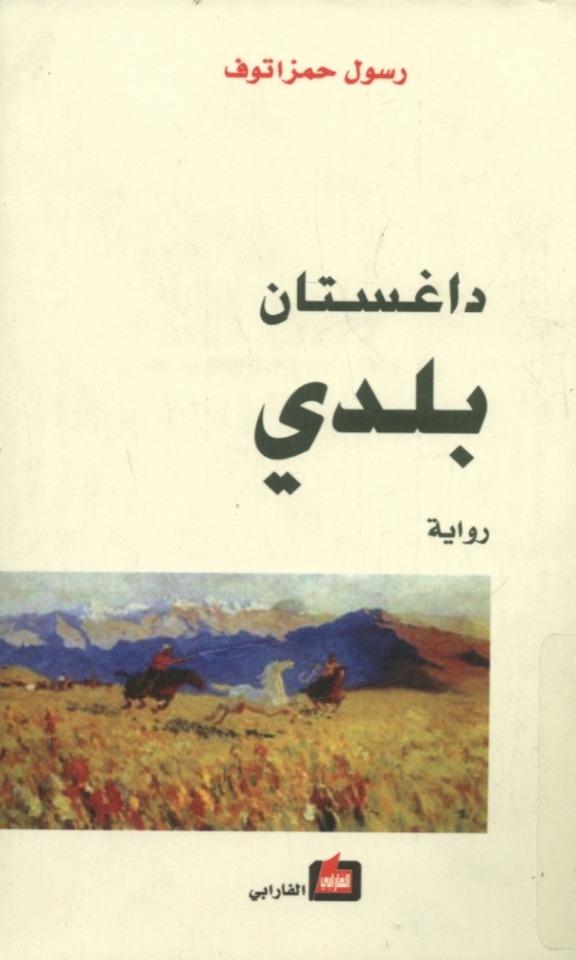
8 notes
·
View notes
Text
يقول الكاتب الداغستاني رسول حمزاتوف: إن الإنسان بحاجة إلى سنتين ليتعلم الكلام، وإلى ستين سنة ليتعلم الصمت
The Dagestani writer Rasul Gamzatov says:
'Man needs two years to learn to speak, and sixty years to learn silence.'
182 notes
·
View notes